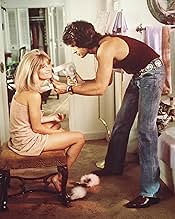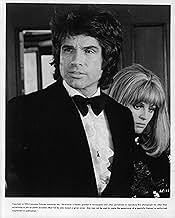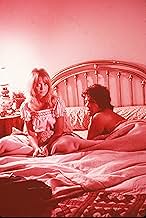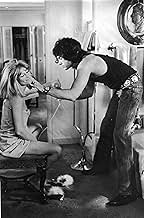Aggiungi una trama nella tua linguaOn Election Day, 1968, irresponsible hairdresser and ladies' man George Roundy is too busy cutting hair and dealing with his girlfriends and mistress Felicia Karpf, whose husband Lester is h... Leggi tuttoOn Election Day, 1968, irresponsible hairdresser and ladies' man George Roundy is too busy cutting hair and dealing with his girlfriends and mistress Felicia Karpf, whose husband Lester is having an affair with his ex-girlfriend Jackie.On Election Day, 1968, irresponsible hairdresser and ladies' man George Roundy is too busy cutting hair and dealing with his girlfriends and mistress Felicia Karpf, whose husband Lester is having an affair with his ex-girlfriend Jackie.
- Vincitore di 1 Oscar
- 3 vittorie e 11 candidature totali
Recensioni in evidenza
Lee Grant won an Oscar for playing Lester's bored wife who can't seem to take her eyes off Beatty, and even her nymphet daughter (a young Carrie Fisher) desperately wanted him to be engaging in reciprocal sex Grant's actually quite jovial and adorable in her role as we heartily feel for her character near the climax
Warren Beatty appears either excitable or distracted through most of the story He lies, hides, and denies facts, doing whatever it takes to make everyone happy...
If you like to see Julie Christie notoriously fellating Beatty underneath an elegant dinner table well don't miss this funny sex comedy which received four Oscar nominations
It's strange that more people haven't written about this movie. In many ways, Shampoo seems to have been forgotten, floating somewhere in film history heaven. I live in Los Angeles and have never heard about it being screened anywhere. Dave Kehr and the critical establishment in general have all written it off as a film that hasn't aged well. And I've never seen a book written about either Shampoo or Ashby. Am I living in a vault or is this really the legacy of Shampoo? If you don't like this movie, I urge you to write or contact me. My e-mail address is listed above. I simply don't understand why more people don't
One thing George has consistently wanted to do is open his own hair salon; one day, he turns to Lester and Felicia (Jack Warden and Lee Grant), a wealthy, local-area couple. However, another problem emerges for George and that is the fact that Lester's current mistress (Julie Christie) is one of George's former girlfriends. Lester just outright assumes George, because of his appearance and choice of occupation, is gay, and doesn't see him as any legitimate sexual threat. It isn't until George becomes closer to Lester, meeting his wife, rekindling things with Lester's mistress, and even becoming entranced with select other women that George succumbs to furthering his pedigree as a sexual deviant.
Shampoo subtly evokes the breakdown of the limiting and often sexually regressive sexual politics and standards of the 1960's; it plays similar instruments as Paul Mazursky's brilliant and underrated Bob & Carol & Ted & Alice where the very nature of its plot is subversive because it takes a sensitive, introspective camera into characters' bedrooms rather than simply closing the door on it. It's a period of time in American cinema that I cheekily bill "what I do in the bedroom is all of your business," due to the liberal mindset and furtherance of sexual freedom, orientation, and behavior in public. In the contemporary, sex is still a social taboo in America, but with each year, be it what is accepted by the MPAA, or what is casually discussed by young people in a serious, social setting, the stigma of sex is continuing to be broken in many ways.
Shampoo looks at the social mores by picking a character who is contemptible not because he loves his sex but because of how dishonest he chooses to be. There's nothing wrong with having multiple sexual partners, nor is there nothing inherently wrong with practicing polygamy or sleeping around. There is something wrong, however, with being dishonest or deceptive about it, which is what George consistently is. With that, screenwriters Robert Towne and Beatty seem to recognize this, and Beatty himself seems to recognize it as he's playing the character. Nonetheless, he challenges you to like him largely by the quick-witted and zippy way he moves and conducts himself, as well as the way he works and entertains his clients. He may not be an easy character to like, but he's not an easy character to write off.
With that, Beatty gives an entertaining performance and effective turns an ensemble film into what could easily be mistaken as a one-man show, if it wasn't for the significant presences of Goldie Hawn and Lee Grant, specifically Grant who winds up having some strong scenes with Beatty during more pivotal moments of the film. These inclusions make Shampoo more likable throughout all the contemptible attributes of the film, and the film winds up addressing sexual politics in a way that doesn't tell the audience, but show them. It sort of walks in circles, not always coming to a clear point, but Beatty's performance and its more subtler approach to the material is enough to make it, if nothing else, a thematically and fundamentally interesting piece for the time.
Starring: Warren Beatty, Goldie Hawn, Julie Christie, Jack Warden, and Lee Grant. Directed by: Hal Ashby.
Yet, I cannot blame this film for what it does well, which is portray the life of a man who simply wants a good time and success and an accurate picture of the times of 1968 when Nixon was about to be elected, the Summer of Love was almost upon us and free love was a progressive idea. Yet, this movie seems harder on these characters than would be let on. Perhaps it is a nostalgic look-back to a time when there was a great feeling of new-found freedom but these people didn't know what to do with it. Some also criticize it for being chauvinistic but in reality, the females are the most confident, the most aware of their situations and the only ones able to make sense of what the next step should be.
As you might expect, the acting is very good with Beatty playing the character completely aloof, always in his own world trying to think faster than the situations being thrown at him. He realizes what a mess he's in but also knows he doesn't want out so easy. Goldie Hawn is a wonderful, charming and confident actress whose beauty is secondary to her talent while Julie Christie gives the film's best performance as a conflicted woman who seems to know exactly what she will do despite not letting on. The Academy Awards only recognized Lee Grant and Jack Warden, perhaps because they represent a past age, a world about to get completely swept up in the new era being established during the '60s.
Some see it as a political satire, others see it as an unfunny comedy about the consequences of free love. I see it as both as well as a very smart character study of what not to do but also why it's so fun doing it.
Lo sapevi?
- QuizLovers off and on since 1967, Warren Beatty and Julie Christie broke up for good during the making of this movie. They remained friends and later worked together in Il paradiso può attendere (1978).
- BlooperThe Coca-Cola can George drinks from while chatting with Lorna is a post-1968 design.
- Citazioni
George Roundy: Can't we just, eh, be friends?
Lorna: Okay.
[teen-aged Lorna makes George an offer he can't refuse]
Lorna: You wanna fuck?
- Curiosità sui creditiIn the opening credits, horror film producer/actor William Castle is billed as "Bill Castle," but in the end credits he is back to "William Castle."
- ConnessioniFeatured in Precious Images (1986)
- Colonne sonoreWouldn't It Be Nice
(1966) (uncredited)
Music by Brian Wilson
Lyrics by Tony Asher, Mike Love and Brian Wilson
Performed by The Beach Boys
I più visti
- How long is Shampoo?Powered by Alexa
Dettagli
- Data di uscita
- Paese di origine
- Lingua
- Celebre anche come
- Sosyete kuaförü
- Luoghi delle riprese
- 2270 Bowmont Drive, Beverly Hills, California, Stati Uniti(Jackie's House at Bowmont & Hazen)
- Aziende produttrici
- Vedi altri crediti dell’azienda su IMDbPro
Botteghino
- Budget
- 4.000.000 USD (previsto)
- Lordo Stati Uniti e Canada
- 49.407.734 USD
- Lordo in tutto il mondo
- 49.407.734 USD





















